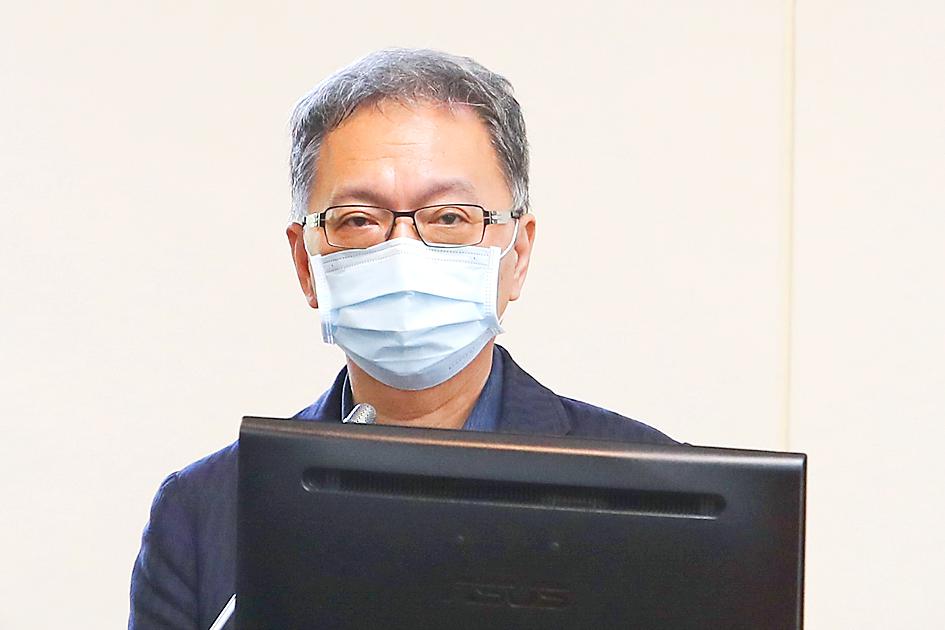If local government regulations on the maximum residue limits of ractopamine in US pork still contradict central government regulation next year, they would become invalid, Deputy Minister of Health and Welfare Hsueh Jui-yuan (薛瑞元) said yesterday.
Hsueh made the remark at a meeting of legislative committees yesterday morning to review a policy allowing imports of US pork containing ractopamine from Jan. 1.
Several local governments have regulations for zero tolerance of ractopamine in pork.

Photo: CNA
Asked by Democratic Progressive Party Legislator Chen Ting-fei (陳亭妃) about a document issued to local governments on the issue, Hsueh said that the Ministry of Health and Welfare had sent official documents to local governments asking them to review their regulations.
According to the Act Governing Food Safety and Sanitation (食品安全衛生管理法), the maximum residue limits of veterinary drugs in meat are stipulated by the central government, so if local regulations contradict the central government’s rules, local governments would be instructed to review their regulations, he said.
“As of Jan. 1, any such local regulations would become invalid, as they contradict the central government,” Hsueh said, adding that the ministry would not revoke the local regulations, but they would automatically be superseded.
If the regulations of the central and local governments contradict one another, people — especially pork vendors — would be confused about which law to follow, he said.
Local regulations with zero tolerance for ractopamine in pork would result in fines for pork vendors selling products containing ractopamine, but the vendors would file lawsuits if they followed the central government’s maximum residue limits, he said.
At the Central Epidemic Command Center’s weekly news conference yesterday afternoon, Minister of Health and Welfare Chen Shih-chung (陳時中) was asked to comment on Hsueh’s remarks.
The draft amendment to the act is being reviewed by the Legislative Yuan, so whether local regulations contradict the act remains unclear, Chen said.
In related news, the Chiayi County Council held a special meeting to review a proposed amendment to the Chiayi County Self-Governance Ordinances for Food Safety Management (嘉義縣食品安全管理自治條例), which would stipulate that in the county, beta-agonists — including ractopamine — must not be detectable in pork or products containing pork.
Nineteen of the county’s 36 councilors have signed the proposal.
A 2017 amendment to Taichung’s self-governance ordinances for food safety management prohibits pork and pork products in the city from containing beta-agonists, Taichung Mayor Lu Shiow-yen (盧秀燕) said yesterday, adding that the municipality would not change its rules just because it received a document from the ministry.
Lu said that the city council was unlikely to propose modifications to its regulations.
New Taipei City’s self-governance ordinance for zero tolerance on ractopamine in pork is being reviewed by the city council, New Taipei City Mayor Hou You-yi (侯友宜) said.
However, the municipality insists on a zero tolerance policy and has instructed its schools to only serve domestic pork.

CHAOS: Iranians took to the streets playing celebratory music after reports of Khamenei’s death on Saturday, while mourners also gathered in Tehran yesterday Iranian Supreme Leader Ayatollah Ali Khamenei was killed in a major attack on Iran launched by Israel and the US, throwing the future of the Islamic republic into doubt and raising the risk of regional instability. Iranian state television and the state-run IRNA news agency announced the 86-year-old’s death early yesterday. US President Donald Trump said it gave Iranians their “greatest chance” to “take back” their country. The announcements came after a joint US and Israeli aerial bombardment that targeted Iranian military and governmental sites. Trump said the “heavy and pinpoint bombing” would continue through the week or as long

TRUST: The KMT said it respected the US’ timing and considerations, and hoped it would continue to honor its commitments to helping Taiwan bolster its defenses and deterrence US President Donald Trump is delaying a multibillion-dollar arms sale to Taiwan to ensure his visit to Beijing is successful, a New York Times report said. The weapons sales package has stalled in the US Department of State, the report said, citing US officials it did not identify. The White House has told agencies not to push forward ahead of Trump’s meeting with Chinese President Xi Jinping (習近平), it said. The two last month held a phone call to discuss trade and geopolitical flashpoints ahead of the summit. Xi raised the Taiwan issue and urged the US to handle arms sales to

BIG SPENDERS: Foreign investors bought the most Taiwan equities since 2005, signaling confidence that an AI boom would continue to benefit chipmakers Taiwan Semiconductor Manufacturing Co’s (TSMC, 台積電) market capitalization swelled to US$2 trillion for the first time following a 4.25 percent rally in its American depositary receipts (ADR) overnight, putting the world’s biggest contract chipmaker sixth on the list of the world’s biggest companies by market capitalization, just behind Amazon.com Inc. The site CompaniesMarketcap.com ranked TSMC ahead of Saudi Aramco and Meta Platforms Inc. The Taiwanese company’s ADRs on Tuesday surged to US$385.75 on the New York Stock Exchange, as strong demand for artificial intelligence (AI) applications led to chip supply constraints and boost revenue growth to record-breaking levels. Each TSMC ADR represents

State-run CPC Corp, Taiwan (CPC, 台灣中油) yesterday said that it had confirmed on Saturday night with its liquefied natural gas (LNG) and crude oil suppliers that shipments are proceeding as scheduled and that domestic supplies remain unaffected. The CPC yesterday announced the gasoline and diesel prices will rise by NT$0.2 and NT$0.4 per liter, respectively, starting Monday, citing Middle East tensions and blizzards in the eastern United States. CPC also iterated it has been reducing the proportion of crude oil imports from the Middle East and diversifying its supply sources in the past few years in response to geopolitical risks, expanding